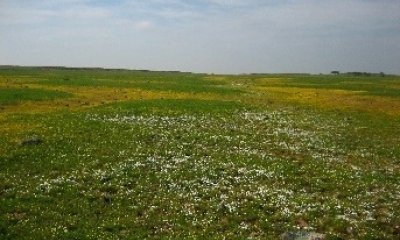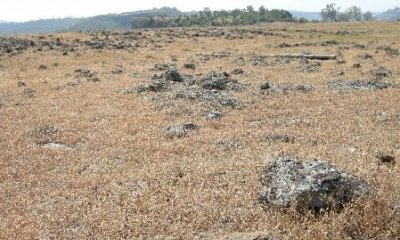
Shallow Latite Ridgetops
Scenario model
Current ecosystem state
Select a state
Management practices/drivers
Select a transition or restoration pathway
- Transition T1.a More details
- Restoration pathway R2.a More details
-
No transition or restoration pathway between the selected states has been described
Target ecosystem state
Select a state
Mechanism
This transition occurs because of climate change. Generally, more variability in the timing and amount of annual precipitation coupled with warmer winter temperatures may lead to further fragmentation and/or less biodiversity in the ephemeral pools, where they do occur. Extinction events may occur for many endemic fauna and flora species within and around the pools. Deeper soils within the complex may increasingly support shrubs (chaparral species) and nutrient and hydrological cycling regimes may be significantly altered. Overgrazed plant communities are less resilient and more likely to cross this threshold than ungrazed and lightly (or sustainably) grazed sites.
Model keys
Briefcase
Add ecological sites and Major Land Resource Areas to your briefcase by clicking on the briefcase (![]() ) icon wherever it occurs. Drag and drop items to reorder. Cookies are used to store briefcase items between browsing sessions. Because of this, the number of items that can be added to your briefcase is limited, and briefcase items added on one device and browser cannot be accessed from another device or browser. Users who do not wish to place cookies on their devices should not use the briefcase tool. Briefcase cookies serve no other purpose than described here and are deleted whenever browsing history is cleared.
) icon wherever it occurs. Drag and drop items to reorder. Cookies are used to store briefcase items between browsing sessions. Because of this, the number of items that can be added to your briefcase is limited, and briefcase items added on one device and browser cannot be accessed from another device or browser. Users who do not wish to place cookies on their devices should not use the briefcase tool. Briefcase cookies serve no other purpose than described here and are deleted whenever browsing history is cleared.
Ecological sites
Major Land Resource Areas
The Ecosystem Dynamics Interpretive Tool is an information system framework developed by the USDA-ARS Jornada Experimental Range, USDA Natural Resources Conservation Service, and New Mexico State University.









